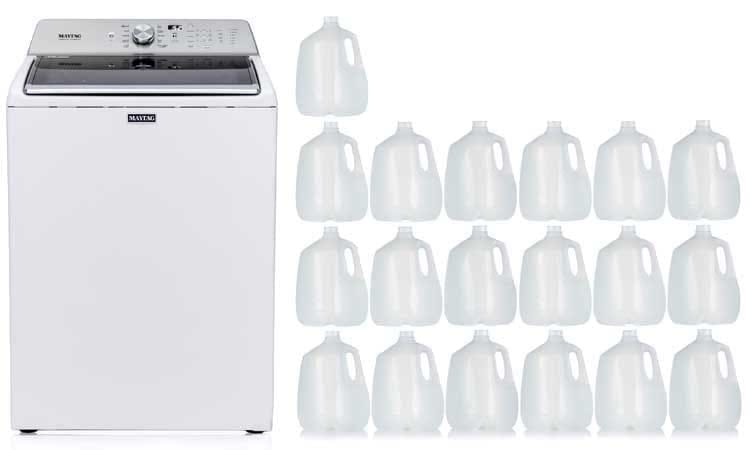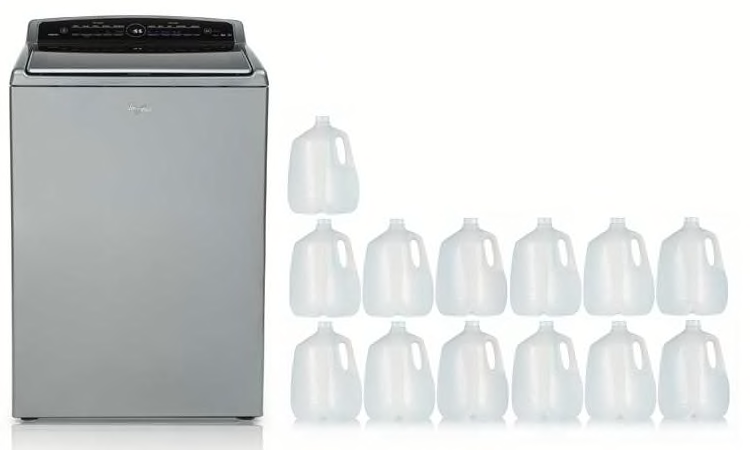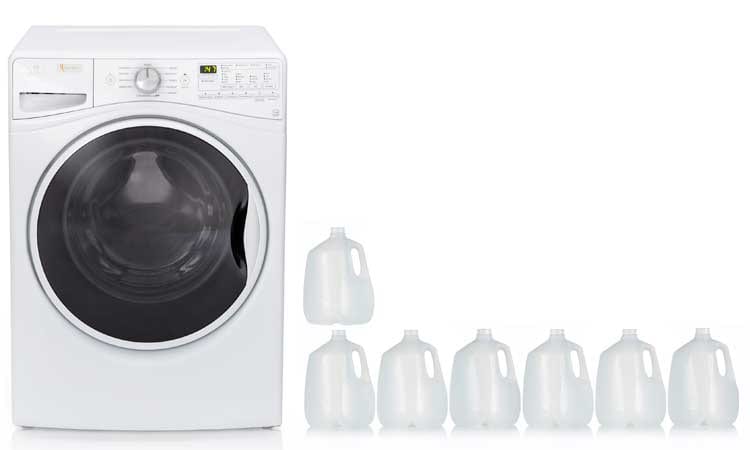Today's more efficient washing machines use so much less water than older machines that some consumers wonder whether their washer will get their clothes clean. This is especially true for people who have switched from a traditional agitator top-loader to a high-efficiency top-loader. Some are so concerned that they add more water to the machine with a bucket or garden hose.
That's a really bad idea.
In fact, adding too much water can result in dingier clothes. "Cleaning may worsen because the clothes aren't rubbing against each other in all that water—it's not what the machine's design intended," says Emilio Gonzalez, the engineer who runs Consumer Reports' laundry appliance tests.
In recent years, as federal standards have become increasingly tough, washers are using less water and energy. An agitator top-loader that we tested 20 years ago might have used more than 40 gallons of water to wash an average load. Today's agitator machines use considerably less, and HE top-loaders and front-loaders use far less than that.
You'll know your washer is using too little water if the cottons come out dirty, or are nearly dry straight out of the washer. "The only time we saw a model use extremely low levels of water, less than 2 gallons, our laundry came out dirty," Gonzalez says. "We figured out that that LG front-loader had a software problem, which the manufacturer fixed."
To compare the water use of one type of washer to another, we went into our labs recently and ran tests using an 8-pound load, using the normal-wash heavy-soil setting. Here are the results.
Our washing machine ratings offer test results for more than 100 models; be sure to check the scores for water and energy efficiency.
Agitator Top-Loader (19 Gallons)
Some agitator top-loaders still submerge dirty loads in water, with the least water efficient in our ratings using about 25 to 26 gallons to wash an average load. The Maytag MVWB765FW, $800, scored a Good in cleaning, and a Good in our water-efficiency tests, using 19 gallons to wash our load. That's typical for other agitator washers with an automatic load-sensing feature. It adds the right amount of water based on the weight of the load.

High-Efficiency Top-Loader (13 Gallons)
The Whirlpool WTW8700EC HE top-loader, $1,200, used 13 gallons to wash our load. It scored an Excellent in our water-efficiency tests and a Very Good in cleaning. HE top-loaders, which don't have an agitator, typically use 12 to 17 gallons of water in our tests. What do the results look like? "In many models the laundry is washed in a shallow pool of water. In some models, the water level is so low you may never even see a pool of water," says the American Cleaning Institute.

Front-Loader (7 Gallons)
As a group, front-loaders are the most water-efficient washing machines in our tests, scoring a Very Good or an Excellent in this test. The Whirlpool WFW85HEFW, $810, scored an Excellent, using 7 gallons to wash our test load, and did a very good job cleaning.

Sensible Ways to Add Water to Your Washer
Forget about adding water from an outside source. Instead use the washer's settings to increase the amount of water for a load. Front-loaders, HE top-loaders, and some newer agitator washers rely on a load-sensing feature to adjust the amount of water, based on the weight of the load.
You can boost water use with a heavy-soil setting; heavy-duty cycle; bulky-items cycle; extra-rinse option; fabric-softener option; or deep-fill option.
Manufacturers' websites might offer other options, and some, including Whirlpool, tell you how to reset your high-efficiency washer to the water levels set at the factory, important if your washer seems to be using less water than it first did.
Improve How Well Your Washer Cleans
If you're disappointed in the way your washing machine cleans, try these tips:
- Allow enough room for the dirty laundry to move around in the washer, without overstuffing. Your owner's manual will guide you.
- Use a more aggressive setting, such as the heavy-soil or heavy-duty cycle.
- Try the steam feature. It improved cleaning slightly in our tests.
- Pick a laundry detergent that packs more punch, such as Tide Plus Ultra Stain Release, Persil ProClean Power Liquid 2in1, Green Works, or any of the other top-scoring grime fighters in our laundry detergent ratings.
- Pretreat tougher stains. Learn how to get rid of mustard, red wine, ink, and gum.
How to Wash Your Clothes Like a Scientist
Want to protect your favorites clothes from fading and shrinking in the laundry? On the 'Consumer 101' TV show, Consumer Reports' Chief Scientific Officer James Dickerson reveals tips for prolonging the life of your wardrobe.


















